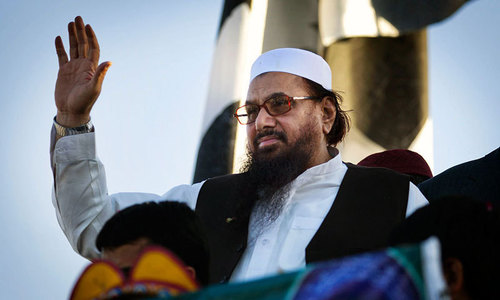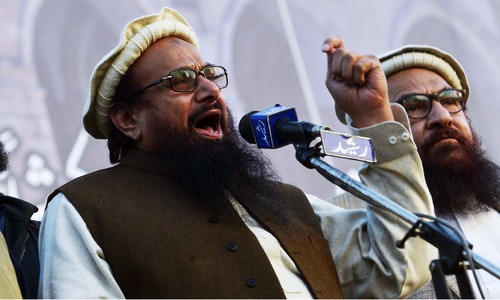ISLAMABAD: Hearing a petition filed by Jamaatud Dawa (JuD) chief Hafiz Mohammad Saeed challenging the presidential ordinance under which his group has been banned for being on the watchlist of the United Nations, Justice Aamer Farooq of the Islamabad High Court (IHC) on Friday issued notices to the principal secretary to the president and the secretaries of law, Cabinet Division and Establishment Division.
President Mamnoon Hussain last month promulgated an ordinance amending the Anti-Terrorism Act, 1997 with regards to proscription of terrorist individuals and organisations to include entities listed by the United Nations Security Council (UNSC) — in a move to declare Hafiz Saeed-linked JuD and Falah-i-Insaniyat Foundation (FIF) as proscribed groups.
The ordinance amends Sections 11-B and 11-EE of the Anti-Terrorism Act, 1997 (XXVII of 1997). Section 11-B sets parameters for proscription of groups, whereas 11-EE describes the grounds for listing of individuals.
Both sections would now include Sub-Section ‘aa’, according to which organisations and individuals “listed under the United Nations (Security Council) Act, 1948 (XIV of 1948), or” will be included in the First Schedule (for organisations) and Fourth Schedule (for individuals), respectively, on an ex-parte basis.
Under Section 11-EE, the requirements were: “(a) concerned in terrorism; (b) an activist, office-bearer or an associate of an organisation kept under observation under section 11D or proscribed under section 11B; and (c) in any way concerned or suspected to be concerned with such organisation or affiliated with any group or organisation suspected to be involved in terrorism or sectarianism or acting on behalf of, or at the direction of, any person or organisation proscribed under this Act.”
Hafiz Saeed contended in the petition that he established JuD in 2002 and cut off all ties with the banned Lashkar-e-Taiba (LeT) but India continued to malign JuD for its past association with the banned outfit.
The petitioner said he was twice — in 2009 and 2017 — kept in detention due to India’s pressure. He added that the UNSC passed a resolution against JuD after which the government of Pakistan kept it in the watchlist.
The JuD chief termed it against the sovereignty of Pakistan that an ordinance was issued to ban his organisation.
The petition contends that Pakistan is a sovereign state, but through this ordinance, its sovereignty has been jeopardised.
It claims that the promulgation of the ordinance and addition of Section 11-EE is not only prejudicial to the sovereignty but also contradictory to the fundamental rights enshrined in the Constitution of Pakistan. It adds that any law which is violative of constitutional provisions is liable to be struck down.
The petition suggests that under Article 199 of the Constitution is competent to strike down any legislation which is beyond the scope of constitution or ultra vires.
It requested the court that the vires of ordinance and consequent amendment in section 11 B and 11-EE of ATA may be declared illegal.
Justice Farooq after initial hearing issued notices to respondents and adjourned further hearing till the third week of March.
Published in Dawn, March 10th, 2018












































